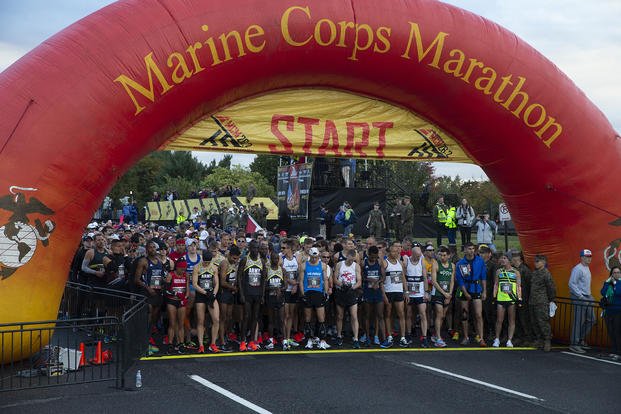Stew, I'm active-duty Navy and am planning to run a marathon this November in San Antonio. I was looking at a more all-around fitness plan this time and would like to use a hybrid of one of your plans, along with the intermediate plan from the website. I've found that cross training seriously reduces my running injuries, plus helps me lose weight and stay interested. If there's a plan you already have for marathon training, please let me know which one it is. Or if you could look over my schedule and offer any advice, I'd appreciate it.
Also - I just did my PRT [physical readiness training], did outstanding high on push-ups, outstanding medium on the run (can't seem to shave off those last 37 seconds) and then good low on curl-ups. What can I do to get my numbers up? I did tons of core training beforehand, and progress is so slow.
I don't believe in shooting for minimum standards. My goal for the next PRT is outstanding in all! I'm going to try your plan this next time around, but for extra effort, is it OK to do abs daily?
I like your plan. It makes sense to mix in some non-impact aerobics like these I do often (swimming, rowing, biking, etc.). You should check out many examples of great non-impact workouts.
Also see other running plans if you need some optional training plans to get you over a hump.
There usually are one or two things that give out on you when running. It is either your lungs or your legs. The cross-training and running plans above will help you with training your cardiovascular system for the long-distance running you are doing, but if you feel your legs are giving out too early, try this: Run and Leg PT for Endurance. Mixing in these workouts, along with some goal-paced intervals will help reduce your 1.5-mile run time by training in your goal zone.
For sit-ups, it sounds as if your problem could be just a pacing issue if you already do lots of core work. Most people burn themselves out by starting too fast. Remember that the sit-ups and run in a fitness test are pacing events. You never would start off a 1.5-mile run with a quarter-mile sprint, right?
Too many people start off the sit-up portion and get 30-35 sit-ups in the first 30 seconds, only to fail the test in the next 1½ minutes and not match your first 30-second score. If you pace your first 30 seconds and shoot for 20 sit-ups, you will find that maintaining that pace for the whole two minutes will be easier to do, and the score of 80 in two minutes is right there.
I have seen people fail this test one day, only to pass it the next by learning this technique. They did not get stronger in a 24-hour period, only smarter.
Try this, too, about 3-4 weeks before your next physical fitness test:
- 15 Day Starter Plan
- Lower Back Plan: Great for core strength and flexibility
Stew Smith is a former Navy SEAL and fitness author certified as a Strength and Conditioning Specialist (CSCS) with the National Strength and Conditioning Association. Visit his Fitness eBook store if you’re looking to start a workout program to create a healthy lifestyle. Send your fitness questions to stew@stewsmith.com.
Want to Learn More About Military Life?
Whether you're thinking of joining the military, looking for fitness and basic training tips, or keeping up with military life and benefits, Military.com has you covered. Subscribe to Military.com to have military news, updates and resources delivered directly to your inbox.




















